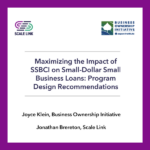BOI and the Initiative for Inclusive Entrepreneurship (Newsletter) – The Aspen Institute


At the beginning of this year, the Aspen Institute’s Business Ownership Initiative joined the Initiative for Inclusive Entrepreneurship (IIE), a national effort to expand access to capital for small businesses owned by socially and economically disadvantaged individuals. Announced in October 2022 by Vice President Kamala Harris, IIE harnesses the power of public-private collaboration to ensure the equitable implementation of the U.S. Department of the Treasury’s $10 billion State Small Business Credit Initiative (SSBCI), 40% of which is designated for businesses owned by socially and economically disadvantaged individuals (SEDI).
Initially incubated by Hyphen, a leading national public-private partnership accelerator, as an 18-month pilot, the initiative’s implementation partners include BOI, Founders First Capital Partners, JumpStart, Mission Driven Finance, Next Street, Nowak Metro Finance Lab, and Scale Link. Starting in July 2024, the Milken Institute began serving as IIE’s new home.
We’re excited to be part of IIE because we believe SSBCI is primed to be the most significant small business program in US history. As such, it’s essential that these resources reach the business owners that struggle the most to access capital. Our role in IIE involves a partnership with Scale Link to design and communicate recommendations for how states can craft SSBCI programs that support CDFI loans of less than $100,000. This is a natural extension of our decade-long efforts with the Microfinance Impact Collaborative, aimed at expanding CDFI microlending to better serve business owners of color.
We’ve accomplished a lot in the past nine months, with more in store as we work to help CDFIs and states to realize the potential of SSBCI. Check out the policy recommendations, tools, and content we’ve developed to date, and stay tuned for more on this important work.
Our new briefs — developed in partnership with Scale Link and with support from IIE— provide recommendations on how SSBCI administrators can increase collaboration with CDFIs to increase small business loans of under $100,000 to socially and economically disadvantaged individuals. Recommendations are provided for three separate SSBCI product solutions: capital access programs, loan guarantee programs, and loan participation programs. Participation in these new capital tools has both mission and financial implications for the CDFI, and decisions about whether and how to engage are complex to navigate. To help CDFIs in making these choices, we’ve also created this decision guide and financial modeling tool.
Today — Monday, October 7 — from 3:30 to 5:30 p.m. ET, I’ll be participating in this event hosted by the U.S. Treasury, “Scaling Community Finance with the State Small Business Credit Initiative.” The first panel discussion will present a case study of four states that deploy SSBCI funding to support small business lending through the Access Small Business Program managed by Calvert Impact. The second panel will feature a discussion with IIE and BOI about their assessment of opportunities to scale CDFI microlending using SSBCI. The event will not be recorded.
Click here to register for the livestream event
For those attending the 2024 OFN Conference in Los Angeles, I’ll be part of an October 23 panel with Jonathan Brereton of Scale Link and Ted Piccolo of Mission Driven Finance, “Leveraging SSBCI to Support Small Dollar Lending.”
We’ll talk about how IIE can be used to support CDFI microlending and the work of Native CDFIs.
SSBCI is a landmark $10 billion, 10-year program designed to enhance access to capital for small businesses and entrepreneurs across the US. This initiative offers more opportunities for CDFIs compared to its previous version over a decade ago, largely due to a stronger focus on reaching key target markets. In this introductory plenary session at the OFN 2024 Small Business Finance Forum, which I had the pleasure of moderating, panelists explore why CDFIs are engaging with this program and discuss strategies to help them leverage these resources effectively, aiming for a lasting positive impact on their organizations and communities.
The Business Ownership Initiative at the Aspen Institute is an initiative of the Institute’s Economic Opportunities Program (EOP), which advances promising strategies, policies, and ideas to help low- and moderate-income Americans connect to and thrive in a changing economy.

If your bills feel unmanageable, you aren’t alone. Recent reports found that 30% of people are less able to afford bills today than they...

Blog Posts Archives UnfavoriteFavorite February 20, 2026 Financial Security Program A collaboration of Aspen Institute Financial Security Program and the...

Colleges are navigating enrollment pressures, renewed federal oversight, and growing scrutiny around how families finance higher education. This week’s developments...